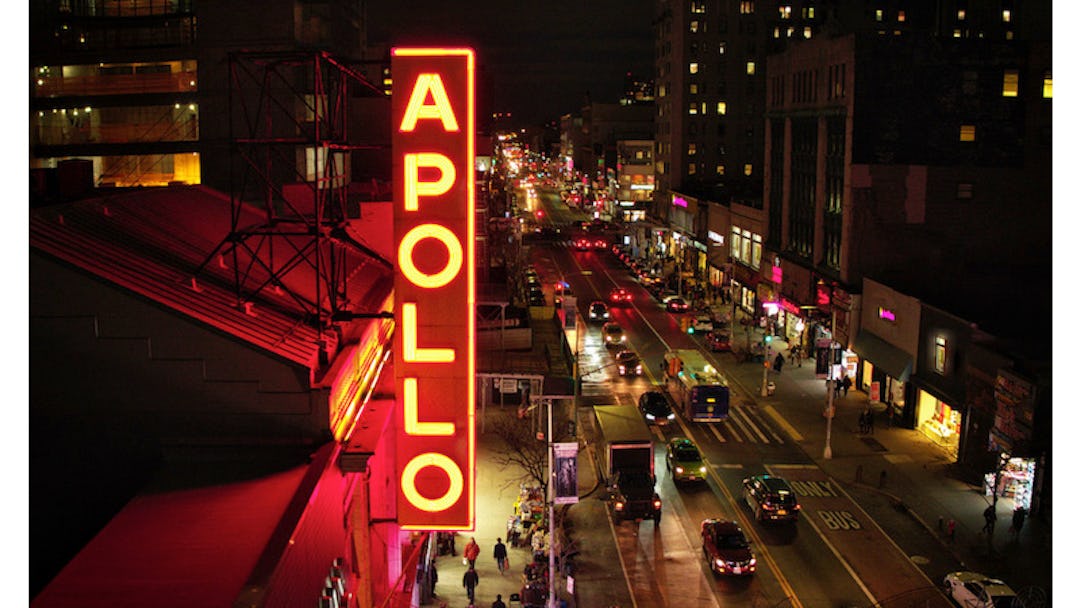It has become something of a tradition for the Tribeca Film Festival to open with a performing arts documentary (recent examples include Clive Davis: The Soundtrack of Our Lives and Live From New York! ), and it’s easy to cynically read this as a move to attract lots of stars for opening night, or to use the post-film mini-concerts to charge a hefty ticket price. But last year’s Love, Gilda dispensed with the latter, and the more I go to Tribeca, the more I’m convinced that this is simply smart branding. From its kickoff back in 2002 – by now mythologized as a gesture by founders Robert De Niro and Jane Rosenthal to boost downtown NYC post-9/11 – Tribeca has always been a festival as much about itself, about its proud station as a Gotham film festival, than about any particular film. And thus, launching each festival with a celebration of artists, of musicians and comedians and dancers, is as much a mission statement as the festival theme (this year’s: “Storytelling is timeless”).
And so it was that the 18thannual Tribeca Film Festival kicked off last night with The Apollo, a new documentary celebration of the venerated Harlem performing arts venue, and for that extra boost of verisimilitude, the event was held at the Apollo itself. (I will note that there’s something a little Twilight Zone-y about watching a movie with so many shots of the seats you’re sitting in). The Apollo opened its doors on 125th Street in 1934, and the sheer volume of talent that has crossed that stage is simply staggering – and over the course of the film’s 98 minutes, director Roger Ross Williams gives them their due.
But he also takes pains to tell the stories of key figures behind the scenes, both of the past and present, including talent scout Ralph Cooper, current historian and tour guide Billy “Mr. Apollo” Mitchell, longtime Amateur Night warm-up artist Joe Grey, and original owner Frank Schillman. Some of it amounts to hagiography, but not all; the exploitative tendencies of Mr. Schillman are particularly well-documented (he worked his acts to the bone, with multiple shows a day, often for minimal pay, and kept note cards logging his complaints about performers’ appearance, attitude, and box office).
(Tribeca Film Festival)
But much of what The Apollo does, and does well, is contribute to the folklore. Even casual admirers may know about rubbing the “Tree of Hope,” but when Leslie Uggams shares her memories of appearing at the Apollo as a child performer, and sharing the bill with those legends, it’s valuable – it’s important to record these stories, before their witnesses are gone themselves. And interview subjects like her have insight to add, beyond the (incredible) archival footage, particularly regarding the camaraderie and education that was happening backstage during those shows.
The picture works best when it sticks to the riveting history of the venue, and to its tricky present as a not-for-profit foundation. In Frederick Wisesman-style eavesdropping on board meetings and discussions, the parties tasked with keeping the venue alive must ask: Is it a shrine to the past or a continued presence? (The film seems to hope for the latter, and uses as its framework the theater’s 2018 staging and premiere of a live adaptation of Ta-Nehisi Coates’s Between the World & Me.)
“Our struggle is defined by our music and our art,” Williams explained in his introduction, and in trying to dramatize that big idea, his film ends up meandering a bit – there’s a lot of ground to cover, and the through-line isn’t always clear. There was always more to the Apollo when what was happening onstage, but as the film attempts to properly contextualize, it comes across, at times, like a Cliff’s Notes of the black experience in America. Yet Williams eventually pulls his strands together, with an effective and moving juxtaposition of words, images, and history in the closing moments.
In a film with plenty of moments to cheer for, one stood out: the spontaneous applause greeting the footage of Obama’s appearance on the Apollo stage in 2012 (and his acapella Al Green warble). It was a great moment, to be sure, for the theater and the film, but also a reminder of a time when the office stood for many of the same things as the venue: hope, dreams, struggle, and black excellence. And that disparity was not lost on Mr. De Niro, who (as you may have noticed) does not much care for the man currently holding the office. “In these disturbing times,” De Niro noted, “when the administration is promoting divisiveness and racism, by being here tonight, we are making a statement that we reject it.” And as the audience roared, he continued, his voice firm with the righteous anger that’s fueled so much of his best work: “No, you don’t. Not in this house. Not on this stage.”
“The Apollo” will play again on Saturday and Monday at the Tribeca Film Festival before its HBO debut this fall. The Tribeca Film Festival continues through May 5.
